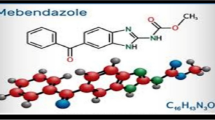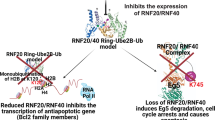Abstract
Purpose
Anti-helmintic drugs mebendazole and albendazole are commonly used to treat a variety of parasitic infections. They have recently shown some promising results in pre-clinical in vitro and in vivo anti-cancer studies.
Methods
We compare their efficacy in breast and colon cancer cell lines as well as in non-cancerous cells and elucidate their mechanism of action. The drugs were screened for cytotoxicity in MDA-MB-231, MCF-7 (breast cancer), HT-29 (colorectal cancer), and mesenchymal stromal cells, using the MTT assay. Their effects on the cell cycle, tubulin levels, and cell death mechanisms were analysed using flow cytometry and fluorescent microscopy.
Results
Mebendazole and albendazole were found to selectively kill cancer cells, being most potent in the colorectal cancer cell line HT-29, with both drugs having IC50 values of less than 1 µM at 48 h. Both mebendazole and albendazole induced classical apoptosis characterised by caspase-3 activation, phosphatidylserine exposure, DNA fragmentation, mitochondrial membrane permeability, and reactive oxygen species production. Cell cycle arrest in the G2/M phase was found, and tubulin polymerisation was disrupted.
Conclusion
Mebendazole and albendazole were shown to cause selective cancer cell death via a mechanism of classical apoptosis and cell cycle arrest, involving the destabilisation of microtubules.


Similar content being viewed by others
Availability of data and materials
All data are available from the corresponding author upon reasonable request.
Code availability
Not applicable.
References
Al-Bassam J, Corbett KD (2012) Alpha-tubulin acetylation from the inside out. Proc Natl Acad Sci USA 109(48):19515–19516
Castro LSEPW, Kviecinski MR, Ourique F, Parisotto EB, Grinevivius VMAS, Correia JFG, Filho DW, Pedrosa RC (2016) Albendazole as a promising molecule for tumor control. Redox Biol 10:90–99
Chu SWL, Badar S, Morris DL (2009) Pourgholami MH (2009) Potent inhibition of tubulin polymerisation and proliferation of paclitaxel-resistant 1A9PTX22 human ovarian cancer cells by albendazole. Anticancer Res 29:3791–3796
Doudican N, Rodriguez A, Osman I, Orlow SJ (2008) Mebendazole induces apoptosis via Bcl-2 inactivation in chemoresistant melanoma cells. Mol Cancer Res 6(8):1308–1315
Ellman GL (1959) Tissue sulfhydryl groups. Arch Biochem Biophys 82(1):70–77
Lai SR, Castello SA, Robinson AC, Koehler JW (2017) In vitro anti-tubulin effects of mebendazole and fenbendazole on canine glioma cells. Vet Comp Oncol 15(4):1445–1454
Liu H, Sun H, Zhang B, Liu S, Deng S, Weng Z, Zuo B, Yang J (2020) He Y (2020) 18F-FDG PET imaging for monitoring the early anti-tumor effect of albendazole on triple negative breast cancer. Breast Cancer 27:372–380
Markowitz D, Ha G, Ruggieri R, Symons M (2017) Microtubule-targeting agents can sensitize cancer cells to ionizing radiation by an interphase-based mechanism. Oncotargets Ther 10:5633–5642
Mosmann T (1983) Rapid colorimetric assay for cellular growth and survival: application to proliferation and cytotoxicity assays. J Immunol Methods 65(1–2):55–63
Mukhopadhyay T, Sasaki J, Ramesh R, Roth JA (2002) Mebendazole elicits a potent antitumor effect on human cancer cell lines both in vitro and in vivo. Clin Cancer Res 8:2963–2969
Neubig RR, Spedding M, Kenakin T, Christopoulis A (2003) International Union of Pharmacology Committee on Receptor Nomenclature and Drug Classification. XXXVIII. Update on terms and symbols in quantitative pharmacology. Pharmacol Rev 55(4):597–606
Nygren P, Larsson R (2013) Drug repositioning from bench to bedside: tumor remission by the antihelmintic drug mebendazole in refractory metastatic colon cancer. Acta Oncol 53:427–428
Oyaizu H, Adachi Y, Taketani S, Tokunaga R, Fukuhara S, Ikehara S (1999) A crucial role of caspase 3 and caspase 8 in paclitaxel-induced apoptosis. Mol Cell Biol Res Commun 2(1):36–41
Patel K, Doudican NZ, Schiff PB, Orlow SJ (2011) Albendazole sensitizes cancer cells to ionizing radiation. Rad Oncol 6:160
Pinto LC, Mesquita FP, Soares BM, da Silva EL, Puty B, de Oliveira EHC, Burbano RR, Montenegro RC (2019) Mebendazole induces apoptosis via C-MYC inactivation in malignant ascites cell line (AGP01). Toxicol in Vitro 60:305–312
Pourgholami MH, Akhter J, Wang L, Lu Y, Morris DL (2005) Antitumor activity of albendazole against the human colorectal cancer cell line HT-29: in vitro and in a xenograft model of peritoneal carcinomatosis. Cancer Chemother Pharmacol 55(5):425–432
Russell GJ, Lacey E (1995) Inhibition of [3H] mebendazole binding to tubulin by structurally diverse microtubule inhibitors which interact at the colchicine binding site. Biochem Mol Biol Int 35:1153–1159
Sasaki J, Ramesh R, Chada S, Gomyo Y, Roth JA, Mukhopadhyay T (2002) The antihelmintic drug mebendazole induces mitotic arrest and apoptosis by depolymeriseing tubulin in non-small cell lung cancer cells. Mol Cancer Ther 1(13):1201–1209
Skibinski CG, Williamson T, Riggins GJ (2018) Mebendazole and radiation in combination increase survival through anticancer mechanism in an intracranial rodent model of malignant meningioma. J Neuro-Oncol 140:529–538
Wang LJ, Lee YC, Huang CH, Shi YJ, Chen YJ, Pi SN, Chou YW, Chang LS (2019) Non-mitotic effect of albendazole triggers apoptosis of human leukemia cells via SIRT3/ROS/p38 MAPK/TTP axis-mediated TNFa upregulation. Biochem Pharmacol 162:154–168
Williamson T, Bai RY, Staedtke V, Huso D, Riggins GJ (2016) Mebendazole and a non-steroidal anti-inflammatory combine to reduce tumor initiation in a colon cancer preclinical model. Oncotarget 7(42):68571–68584
Zhang X, Zhao J, Gao Z, Pei D, Gao C (2017) Anthelmintic drug albendazole arrests human gastric cancer cells at the mitotic phase and induces apoptosis. Exp Ther Med 13:595–603
Zhang L, Dratver MB, Yazal T, Dong K, Nguyen A, Yu G, Dao A, Dratver MB, Duhachek-Muggy S, Bhat K, Alli C, Pajonk F, Vlashi E (2019a) Mebendazole potentiates radiation therapy in triple-negative breast cancer. Int J Rad Oncol 103(1):195–207
Zhang QL, Lian DD, Zhu MJ, Li XM, Lee JK, Yoon TJ, Lee JH, Jiang RH, Kim CD (2019b) Antitumor effect of albendazole on cutaneous squamous cell carcinoma (SCC) cells. BioMed Res Int. https://doi.org/10.1155/2019/3689517
Acknowledgements
We acknowledge funding from the Department of Pharmacology and Toxicology, University of Otago.
Funding
This research was supported by the Department of Pharmacology and Toxicology, School of Biomedical Sciences, University of Otago.
Author information
Authors and Affiliations
Contributions
SKB designed the study and experiments and prepared the manuscript, JSSMP carried out the experiments and the data analysis and contributed to the manuscript.
Corresponding author
Ethics declarations
Conflict of interest
The authors have no conflicts of interest to declare.
Ethics approval
Not applicable.
Consent to participate
Not applicable.
Consent for publication
Not applicable.
Additional information
Publisher's Note
Springer Nature remains neutral with regard to jurisdictional claims in published maps and institutional affiliations.
Rights and permissions
About this article
Cite this article
Petersen, J.S.S.M., Baird, S.K. Treatment of breast and colon cancer cell lines with anti-helmintic benzimidazoles mebendazole or albendazole results in selective apoptotic cell death. J Cancer Res Clin Oncol 147, 2945–2953 (2021). https://doi.org/10.1007/s00432-021-03698-0
Received:
Accepted:
Published:
Issue Date:
DOI: https://doi.org/10.1007/s00432-021-03698-0




